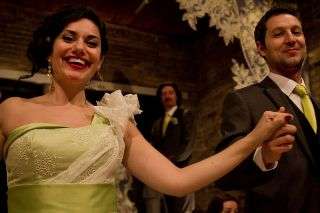|
Back
Mozart for the iphone age Toronto
The Burroughes
05/29/2013 - & May 30, 31, June 2, 2013
Wolfgang Amadeus Mozart: Figaro’s Wedding, K. 492 (arr. Christopher Mokrzewski)
Stephen Hegedus (Figaro), Miriam Khalil (Susanna, Lisa Di Maria (Rosina), Alexander Dobson (Alberto), Teiya Kasahara (Cherubino), Loralie Kirkpatrick (Marcellina), Gregory Finney (Dr. Bartolo, Antonio), Michael Ciufo (Basilio, Curzio)
Music in the Barns Chamber Ensemble, Christopher Mokrezewski (Music Director/Pianist/Arranger)
Joel Ivany (Director/Librettist), Patrick DuWors (Set Designer), Erika Connors (Set and Costume Designer), Rosemarie Umetsu (Wedding Gown Designer), Jason Hand (Lighting Designer)

M. Khalil & S. Hegedus (© Roger Rousseau)
Some years ago Jeremy Sams made a translation of Mozart’s Le nozze di Figaro for ENO, giving it the title Figaro’s Wedding. This is not that at all. Director Joel Ivany has devised a considerable reworking of Lorenzo Da Ponte’s libretto, setting the work in today’s Toronto. The Almavivas are not count and countess, but Alberto, Figaro’s best friend (and boss), and Rosina, Susanna’s maid of honour. Figaro and Susanna met at hairdressing school. Cherubino is a butch lesbian who has been living with the Almavivas. Marcellina is the event manager for the wedding, while Basilio is the wedding co-ordinator. Their demand for more money is the main source of anxiety in the final hours before the wedding.
Music Director Christopher Mokrzewski did not have to be as bold as Ivany in his deft arrangement of the score for piano quintet, the scale of which is in keeping with the scale of the venue, which seats about 100. The audience (“wedding guests”) shuttle between two spaces, one for Act I ("The Wedding Rehearsal", where we find Figaro calculating the space available for guests) and Act III ("The Ceremony"). Acts II ("The Bachelorette Party") and IV ("The Reception") are in a larger space giving more scope for action to take place among the audience (oops - "guests"). Adding to the festive nature of the event is the handy cash bar.
The work is shortened a bit with the cutting of the subplot involving Antonio’s daughter, Barbarina. Also there is no chorus. However the arias and ensembles remain and it is all tautly played with much attention to musical and dramatic detail. And let’s not forget that in such an intimate venue, everything is up close and personal.
As to the singers, Stephen Hegedus quickly establishes a well-defined style of performance that also (happily) characterizes the rest of the soloists as they appear. Teiya Kasahara never lets up for a second in her portrayal of upfront lesbian Cherubino. Miriam Khalil vividly portrays the roller-coaster emotions of the resourceful Susanna, and Lisa DiMaria is a heartfelt Rosina. Alexander Dobson is a headstrong Alberto whose final contrition is effectively magnified coming as it does from such a mercurial character. Gregory Finney uses his comedic talents to great effect as the gardener Antonio (who has eyes for...Figaro - who knew?) and as Dr. Bartolo who is given a wonderfully pompous little sermon as he officiates at the ceremony.
There is much use of iphones, as when the best man (Alberto) is caught texting (or sexting) during the ceremony. Other real modern life moments occur when Cherubino attempts to seduce Rosina who turns out to be more than a little bi-curious. We also witness the bride chuggalugging a vodka cooler. During the reception Cherubino (“You can call me ‘Bino”) tipsily flirts with female guests.
As at so many weddings, The Gown is a major object of attention and Rosemarie Umetsu’s creation is fully worthy of its starring role.
The venue is The Burroughes, the sixth floor of a century-old furniture store, yet another instance of Against the Grain Theatre using a non-traditional venue. The string quartet members are from the Music in the Barns Chamber Ensemble, which sounds rural but most definitely is not, “the Barns” being an old complex of streetcar barns converted into artist live/work/performance spaces - I wonder when AtG will perform there.
After much frenzied action the forgiveness scene suddenly emerges in all its transcendental beauty (the string quartet is wonderfully effective here). The finale contains reference to the crazy day, la folle journée, of Beaumarchais’s original title. Joel Ivany and his resourceful crew have devised a strikingly original work from Mozart’s imperishable 227-year-old opera.
Michael Johnson
|